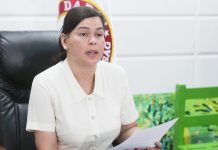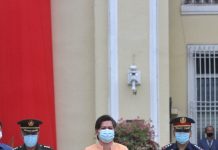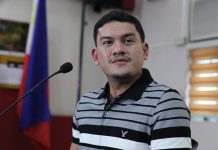Health Secretary Francisco Duque III promised to look into complaints by certain quarters that Department of Health-funded studies involved some researchers whose probity and fairness are suspect because of their membership in organizations espousing contentious health advocacies.
Duque made the vow during a media forum in Davao City last Thursday on the Accelerated Hunger-Mitigation Program (AHMP), national program addressing hunger and malnutrition.
He said the DOH is scheduled to hold a big meeting in Manila this Monday (August 24) with agencies that would consider complaints against the controversial 2006 health assessment of sitio Camocaan in Hagonoy, Davao del Sur conducted by an 11-member study group. The group was commissioned by the DOH to look into allegations of Dr. Romeo Quijano, president of the militant Pesticide Action Network-Philippines (PAN-Philippines), that people in Camocaan were dying due to exposure to chemical aerial spraying by a banana plantation in the area.
The Pilipino Banana Growers and Exporters Association (PBGEA) and Crop Life, an organization of agro chemical companies, complained that the study was full of inadequacies and tentative findings which could not be the basis of the team’s recommendation to ban aerial spraying.
The banana group’s technical team said they found certain persons Quijano had repeatedly claimed to have died due to aerial spraying, to be alive. They also questioned alleged improprieties employed by the health investigators led by Dr. Alan Dionisio of the
University of the Philippines-Manila National Poison Management and Control Center and the Philippine Society of Clinical ad Occupational Toxicology.
Sometime this week, PBGEA spokesman Anthony B. Sasin charged that the Camocaan study was “rigged” to give credence to the claims of Dr. Quijano that the sitio was poisoned due to aerial spraying.
As proof of PBGEA’s allegation of rigging, Sasin said they found out that Dr. Lynn Crisanta R. Panganiban, a proponent of the study, sits as board director of PANAP-Philippines, the anti pesticide group headed by Dr. Quijano.
Duque said that the critics of the study are welcome to join the meeting which will consider the report of the Inter-Agency Committee on Environmental Health (IACEH).
The health secretary said he will also consider the proposal that health studies should also involve the banana companies themselves.
Officials behind a health research system established in the Philippines said they frown upon studies conducted by researchers known for their biases on certain health issues and concerns.
The government officials were promoting the newly launched National Unified Health Research Agenda (NUHRA) of the Philippine National Health Research Systems (PNHRS) among Mindanao stakeholders.
The PNHRS studies are funded by the Department of Health (DOH), Department of Science and Technology (DoST), Commission on Higher Education (Ched) and the UP Manila National Institutes of Health (UPMNIH).
Dr. Antonio Ligsay, chairman of the PNHR research agenda committee, told Davao media practitioners that researchers known for their bias on topics proposed for research are disqualified.
Ligsay vowed to scrutinize the background of researchers listed in research proposals. in order to protect the integrity of the resulting studies they conduct.
“You can be sure we will not fund studies done by biased researchers,” Ligsay said, adding that the PNHRS was created “to foster high-performing and ethical health research organizations.” In addition, PNHRS will also ensure that health research is linked to the health system’s needs, and make sure that investments in health research yield the most benefits.
PNHRS officials attending the briefing were asked to react to published stories wherein the Pilipino Banana Growers and Exporters Association (PBGEA) accused some researchers of rigging a DOH-funded health study conducted in 2006 in sitio Camoocan in Hagonoy, Davao del Sur where a cavendish banana plantation is located.
In the same briefing, Health Assistant Secretary Paulyn Jean Ruel Ubial declared that the DOH did not conduct the Camocaan health study and all that some DOH employees did was accompany researchers headed by Dr. Allan Dionisio of UP Manila.
Ubial also said the Camocaan study was not enough to be made basis for recommending a ban on aerial spraying. She said there is a need for followup studies before any conclusion can be made. AMA
0 Comments
Oldest






